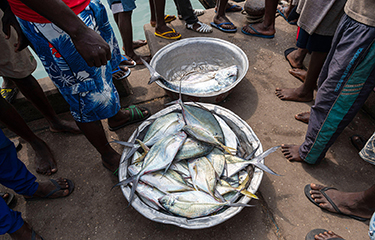Benin is set to become the first African nation to make its fishing fleet’s movements publicly visible.
The country's government announced it has reached a deal with nonprofit Global Fishing Watch (GFW) to establish a vessel-monitoring system (VMS) to track its fleet. Under the deal, the country will share all its data with GFW for presentation on the GFW map – the first African nation to agree to full transparency, according to GFW.
Under the new agreement, GFW has committed to “provide technical support, including fisheries analysis, capacity-building, and training on its vessel monitoring tools," it said.
Benin Minister for Agriculture, Livestock and Fisheries Gaston Cossi Dossouhoui said the government is “committed to eradicating illegal fishing from our waters and taking all action necessary to secure sustainable fisheries.”
The partnership with GFW strengthens Benin’s capability to monitor fishing activities in its waters and enforce the law, demonstrating the government’s commitment to transparency in a bid to grow its nascent blue economy, Dossouhoui said. Benin, like other countries in the Gulf of Guinea, has been battling persistent illegal, unreported, and unregulated (IUU) fishing in its waters.
GFW estimates IUU fishing in Benin and other coastal states in the Gulf of Guinea accounts for nearly 40 percent of all the fish caught in West Africa, posing a serious threat to the region’s development. West Africa and the Gulf of Guinea are areas with some of the highest recorded levels of IUU fishing globally, according to the African Development Bank. The bank estimates the cost of IUU fishing in the two regions is around USD 1.2 billion (EUR 1.1 billion) annually.
“The utilization of legal instruments, and port state measures, in particular, constitute the most cost-effective way of combating IUU fishing,” the bank said.
GFW Program Manager for West and Central Africa Dame Mboup said legal compliance with fishing laws is achievable through greater transparency, which will benefit law-abiding fishers in the region by allowing bad actors to be investigated and targeted for enforcement more easily.
“Violations by unauthorized vessels are prevalent off West Africa’s coast; Benin is demonstrating leadership in using cutting-edge technology and open data to combat illegal fishing,” Mboup said.
Fernand Maxime Ahoyo, a captain with the Maritime Prefect of Benin, said the country’s navy strongly backs the agreement, calling it "a welcome addition" to its fight against IUU.
“Global Fishing Watch’s tools will reinforce Benin’s actions to protect its maritime area,” Ahoyo said.
GFW said it has also signed letters of intent with Cameroon, Gabon, Guinea, Mauritania, and Senegal to strengthen collaboration on governance tools, capacity transfer, and analysis to combat illegal fishing. It also said the regional fisheries commission for the Gulf of Guinea and the Sub-Regional Fisheries Commission have both expressed interest in joining GFW’s “vision for greater fisheries transparency, recognizing that regional cooperation and information-sharing is needed to combat IUU fishing.”
“Regional collaboration is critical to eliminate IUU fishing and restore fish populations,” Mboup said.
A year ago, the countries of Liberia, Côte d’Ivoire, Ghana, Togo, Benin, and Nigeria, through Fisheries Committee for the West Central Gulf of Guinea (FCWC) – an intergovernmental organization that promotes cooperation in fisheries management among them – launched the Regional Monitoring, Control and Surveillance Center (RMCSC) to monitor fishing and related activities in the Gulf of Guinea.
In Côte d’Ivoire, Ghana, Kenya, Senegal and the FCWC, GFW has, in partnership with the international nonprofit TM-Tracking, launched a pilot project to provide authorities with satellite-tracking data, analysis, and training needed to assess a fishing vessel’s recent operations and compliance risk.
“The collaboration will harness a new tool called vessel viewer, which was developed by the two organizations and provides vital information on a vessel’s identity, fishing activity, port visits, and transshipments to help assess the need for inspection and port access,” GFW said.
TM-Tracking recently released a report that found that the number of vessels exploiting African flags to escape effective oversight has been increasing, requiring the prioritization of additional methods of regulation enforcement.
Mboup said it GFW committed to work with countries to allow them to publicly share their vessel-monitoring data, and that its analytical tools and technologies are also available to them, in part with funding support from Bloomberg Philanthropies, Moore Foundation, OAK Foundation and Oceans 5.
Photo courtesy of Global Fishing Watch







